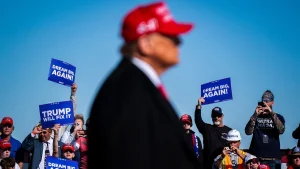Sorry Mr. Sullivan, But You Just Got China So Wrong
On August 27, U.S. National Security Advisor Jake Sullivan arrived in Beijing, kicking off a three-day visit to China. On the first day, he met with Chinese Foreign Minister Wang Yi. To be honest, I’m not too eager to comment on Sullivan’s visit, as it involves assessing the strategic relationship between China and the U.S., which can induce a rather anxious mindset.
Today’s United States feels as though it’s caught between a state of semi-autism and half-dreaming, with a worldview that seems to say, “I don’t care what you think, only what I think.” As for everything else? Just BACK OFF. Dealing with the U.S. today inevitably leads to a profound sense of helplessness and frustration.
To put it bluntly, the U.S. decision-making elite, especially their foreign strategy team, is not normal in its cognition. Chas W. Freeman Jr. described it as self-anesthetization and self-hypnosis. I would say it’s a deep pathology.
This pathology permeates from the inside out, and it’s not just directed at China; it’s their attitude toward the entire world. However, only China refuses to buy into it, and their distortion of China is stronger than in other areas. China is increasingly able to view the U.S. from an equal footing and recognize this abnormality. It’s like the famous fairy tale “The Emperor’s New Clothes,” where the two con men weave invisible clothes while other countries pretend to follow America’s lead in running around naked.
So, what’s Sullivan’s purpose for visiting China? As depicted in the British sitcom “Yes, Prime Minister”, whenever Western governments officially deny any link between two matters through an anonymous official, the reality is often the opposite. Sullivan’s purpose is clear: the Democratic Party needs China’s support in the 2024 U.S. presidential election to help them defeat Trump.

First, the U.S. needs China to convey to the outside world that Biden’s foreign policy is impressive, his financial policies are solid, and his China strategy is effective. Therefore, Biden is a good president, and now he’s passing the torch to Harris, making her a good president too—so everyone should vote for her.
Second, they are laying the groundwork for significant economic policy moves in September. The U.S. economy currently relies on opening and closing the floodgates—too much water? Shut them. Too little water? Open them. Other than that, they can’t produce anything substantive. Their industrial policies, manufacturing reshoring, and infrastructure development are merely a joke. The entire U.S. is caught in a massive bubble. Therefore, they need to lower interest rates, and the cut may be larger than expected. However, if China doesn’t cooperate in macroeconomic, financial, and fiscal support, the U.S. could be in serious trouble. Thus, the U.S. is asking for China’s help.
Unfortunately, the U.S. political scene is currently dominated by the notion that the States is number one and invincible, and forever. The Democrats claim that everything has been fine, and only the Republicans, infected by the “Trump virus,” think otherwise. They insist that closing one’s eyes and repeating that America is the best will make it so, and thus there’s no need to make concessions to China. America has already given China face by coming to Beijing with polite requests, and China should feel honored and bow in gratitude.
And the Republicans are even worse than their colleagues across the aisle, believing the entire world should “pay tribute” to the U.S., feeling honored to be exploited by America. Talk of negotiation? You just don’t deserve it.
This leads to the current stalemate, where America expects China to make “selfless contributions” and even feel good about it. It’s as if America slapped your right cheek, and you’re supposed to offer your left cheek and kindly ask if America’s hand hurts. America demands that China willingly accept sanctions, not speak out, not retaliate, and not bring up Taiwan. They want to do whatever they want, assuring you that Taiwan won’t be “allowed” to pursue so-called legal independence, and that’s enough, you should be grateful. How dare you confront the Philippines in the South China Sea? The Philippines is America’s little brother. And as for Russia, you should just kill it off like we say.
Sullivan is the National Security Advisor to the U.S. President, but this is not a public office. He’s appointed by the president, not requiring Senate approval. He’s just an advisor who serves the president, similar to an imperial envoy in ancient China.
Sullivan and our Foreign Minister Wang Yi have interacted before. Yet despite spending a year trying to understand China, the U.S. still hasn’t corrected its understanding. Or to be blunt, the entire U.S. diplomatic team, from President Biden downwards, is in a collective state of daydreaming, living in a fancy world in their brains.
What makes America so awkward, leaving people feeling helpless and bewildered, is that despite their lack of capability, their dreams are more beautiful than ever before.
This state is best embodied by Harris’s campaign platform: You lack it, I’ll give it to you. You don’t like this, I’ll change it to what you want. The costs and methods don’t matter; just say Harris’s name, and your dreams will come true. This is a surreal moment in the history of Western international relations and a manifestation of the decline of Western civilization, as Oswald Spengler predicted.
Sullivan’s visit is doomed to be a fruitless attempt by the U.S. to gain concessions from China without offering anything in return. The goal is to secure practical commitments from China to maximize Harris’s chances in the election, all without guaranteeing future commitments. It’s highly likely that once they win, they’ll kick down the ladder because the Republicans will certainly be tough the U.S.-China strategy as always. For China, this presents a significant challenge.
Ultimately, what matters is strength. China is special, it’s a rising power with significant emerging market characteristics. This isn’t modesty; it’s the objective reality. Yet, China is increasingly able to view America from a level playing field, adopting a calm attitude toward U.S. relations.
Economically, China certainly faces challenges, but so does the entire world, entering a long-term downturn and macroeconomic stagnation. Among major nations, China’s economic performance, in terms of overall indices, is undoubtedly the best.
For example, if America’s macroeconomic data is as good as they claim, then I’ve got three questions waiting for answers:
First, where do so many of Trump’s supporters come from?
If the incumbent claims they have managed the economy well and the American public buys it, Harris wouldn’t meet a strong opposition challenger like Trump. Unlike China, where people may voice concerns about the economy through various analyses, the U.S. claims everything is going great, while Americans themselves often say they have no idea how this supposed prosperity relates to their daily lives. If things are so great, then why the need for interest rate cuts?

Second, why was non-farm employment revised downward by 810,000 jobs from April last year to March this year?
During this period, the U.S. claimed to have created 2.9 million jobs, but the revision erased 30% of these jobs. This conveniently creates a scenario where the Federal Reserve must cut interest rates. If the economy was truly strong, shouldn’t employment be robust as well?
These employment figures imply that the U.S. requires rate cuts to stimulate the economy to the necessary degree. In this context, China should be confident in recognizing that the U.S. is seeking help from China. In this strategic game initiated by the U.S., China has no obligation to comply. China’s effort should be put on a more constructive strategy toward U.S.-China relations.
This constructive strategy must include one essential component: when the U.S. acts out of line and disrupts the stability of U.S.-China relations, and the relationship is not developing on a healthy track, China must punish and correct the U.S. This is an inevitable path.
Third, what has been the real outcome of U.S. initiatives such as the CHIPS Act, the Inflation Reduction Act, and the $1.2 trillion infrastructure plan?
How many charging stations have been built? How many new railways, roads, and bridges have been constructed? What kind of impact has this had on the U.S. economy? How are the new chip factories progressing? What is the output of these new chip plants? How many computing power centers have been built in the U.S. using advanced computing chips? How many companies are applying large-scale models in ways that are truly creating value and driving productivity growth in the U.S.?
After reflecting on these three questions, we can form a more balanced understanding of the U.S.-China strategic competition. In this new framework, we have reason to believe that China does not need to make concessions to the U.S.
We should also have a broader perspective on Sullivan’s visit or the ongoing strategic dialogue between China and the U.S. Now, China should act more like a patient teacher educating a stubborn student, guiding the next step of America by a combination of words and actions.
China aims to safeguard its national interests while maintaining a healthy and dynamic balance in U.S.-China relations. This is not the unilateral responsibility of one side. Achieving this benefits both sides, and a framework of “tit for tat” and “word for word, action for action” will gradually form, becoming the general trend of future development.
Sullivan arrived and stepped off the plane with no red carpet, only a clearly marked red line on the ground. Even if there’s no carpet now, he doesn’t mind; he still came. Last time, when Blinken visited Shanghai, he was left on his own, but he didn’t mind. Why? Because he doesn’t have the stature to act that way, nor does he have the leverage to make so many demands. Everyone is discussing matters pragmatically—regardless of China’s attitude, they still have to sit down and talk seriously. This marks a subtle shift in the dynamics.
 In the afternoon of August 27th, U.S. National Security Advisor Sullivan’s plane landed in Beijing.
In the afternoon of August 27th, U.S. National Security Advisor Sullivan’s plane landed in Beijing.
In this phase of asymmetric and uneven power growth and transition, recognizing and understanding these details is essential for fully comprehending and managing U.S.-China relations.
Editor: Zhaocheng_Pan
https://www.guancha.cn/ShenYi/2024_08_28_746345.shtml



